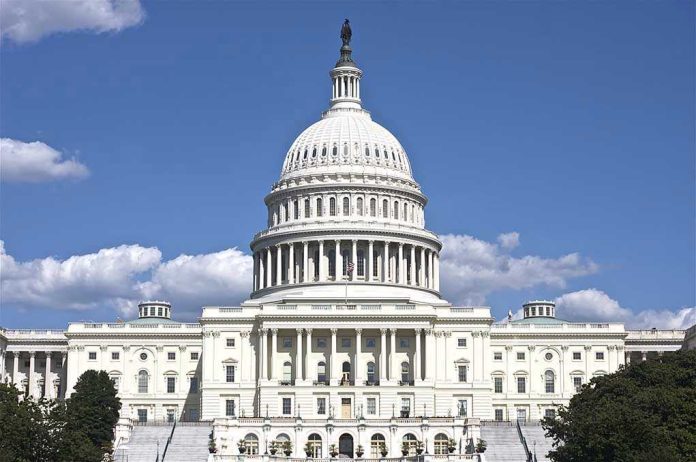
Congress’s inability to agree on a budget has pushed the federal government to the brink of a shutdown record, exposing just how fragile—and fractious—the mechanics of American governance have become.
Story Snapshot
- The current federal shutdown is set to surpass the previous 34-day record, making it the longest in U.S. history.
- Deep partisan divides in Congress have stalled negotiations and paralyzed federal operations.
- Millions affected: from federal workers without pay to businesses and vulnerable communities losing critical services.
- Experts warn of lasting damage to public trust and the American economy if the shutdown drags on.
Congress on the Precipice of a New Shutdown Record
As the first week of November 2025 unfolds, the U.S. government sits idle, its gears ground to a halt by a congressional standoff that shows no signs of resolution. If lawmakers cannot broker a deal this week, the shutdown will eclipse the previous record of 34 days, set in 2018-2019. This is not just another budgetary hiccup—this is a historic breakdown, one that both reveals and deepens the country’s political rifts. The story is not simply about numbers and legislative foot-dragging; it’s about the very architecture of American democracy under stress.
During shutdowns, Congress’s inability to pass appropriations bills or even temporary funding measures forces executive agencies to suspend all but the most essential operations. This time, the dispute centers on fiscal year 2026, with neither side willing to budge on key policy provisions. The impasse has left more than 800,000 federal workers without pay and shuttered countless services, from national parks to regulatory agencies. The result: a palpable sense of frustration and anxiety that ripples through government offices, kitchen tables, and Wall Street alike.
Political Brinkmanship and American Gridlock
Shutdowns are a uniquely American phenomenon, born of a budget process that allows for hard stops when Congress fails to act. Since the 1980s, following a strict interpretation of the Antideficiency Act, federal agencies have had no choice but to cease operations in the absence of appropriated funds. This statutory quirk has given rise to a potent tool of political brinkmanship—one that lawmakers have wielded with increasing frequency as partisanship has intensified over the decades. The present shutdown, triggered by discord over fiscal priorities and policy riders, is the latest—and most dramatic—episode in this recurring drama.
Key players in this saga include congressional leaders from both chambers, the President, and a host of committee chairs whose decisions shape the contours of the debate. Federal employees, once again, have become pawns in a larger ideological contest, their livelihoods contingent on legislative horse-trading. Meanwhile, public frustration is mounting, with advocacy groups and unions demanding resolution and accountability.
Consequences Echo Across the Nation
The immediate effects of the shutdown are impossible to ignore: delayed paychecks for federal workers, frozen research and regulatory activities, and disruptions to everything from airport security to food inspections. The economic drag is real, with businesses reliant on government contracts or permits feeling the pinch. Vulnerable populations—such as veterans, low-income families, and seniors—face uncertainty as benefits and services become increasingly difficult to access.
Beyond the day-to-day disruptions, there are deeper, longer-term consequences. Prolonged shutdowns erode confidence in government, threaten the nation’s credit rating, and saddle taxpayers with additional costs from lost productivity. Experts warn that the current impasse could leave lasting scars on the American psyche and diminish the country’s standing in the world. The spectacle of a government unable to perform its most basic functions is a powerful, unsettling image—one that will not be easily forgotten.
Expert Analysis and Calls for Reform
Fiscal policy experts have sounded the alarm: government shutdowns are costly, inefficient, and ultimately self-defeating. The Peterson Foundation—a respected, nonpartisan voice on budget issues—has documented the mounting toll and called for structural reforms to prevent future crises. Economists point to measurable impacts on GDP and consumer confidence, while political scientists highlight the underlying dysfunction of the budget process itself. Legal scholars note that America’s penchant for shutdowns is an outlier among developed nations, a byproduct of unique statutory requirements and a polarized political culture.
Some commentators argue that shutdowns serve as a necessary check in a divided government, forcing stakeholders to confront difficult trade-offs. Others see them as a glaring failure of leadership, evidence that the system is broken and in need of repair. What is clear is that the current shutdown, poised to break all records, has reignited the debate over how—and whether—Congress can govern effectively in an age of deep division.
Sources:
Peterson Foundation, “A Brief History of U.S. Government Shutdowns”



